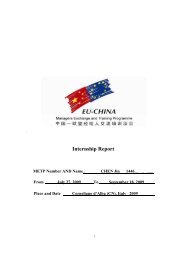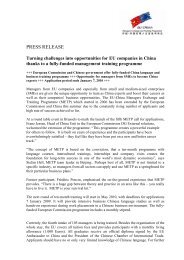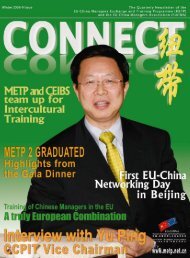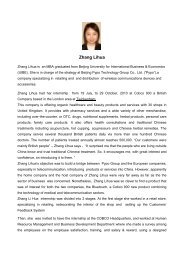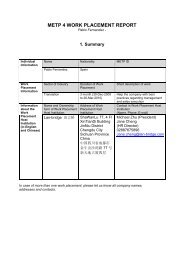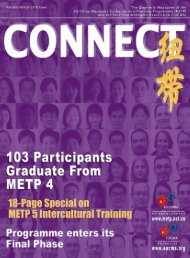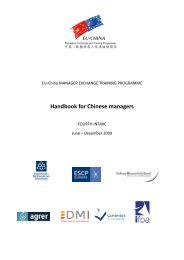Download - EU-China Managers Exchange and Training Programme
Download - EU-China Managers Exchange and Training Programme
Download - EU-China Managers Exchange and Training Programme
Create successful ePaper yourself
Turn your PDF publications into a flip-book with our unique Google optimized e-Paper software.
A<br />
<strong>EU</strong>CMA<br />
<strong>EU</strong>CMA<br />
proach).<br />
If everything is possible in <strong>China</strong>, it is essential to be properly<br />
prepared for the “Chinese adventure”, in order to maximize its<br />
chances of success.<br />
It is naive to assume that “the professional world is governed<br />
by Anglo-Saxon management, <strong>and</strong> the Chinese will end up adapting”,<br />
as one of my European customers suggested to me during our<br />
first meeting. The development of his operations in <strong>China</strong> would<br />
later prove him wrong. It is thus important to put in place a true system<br />
of intercultural management in order to optimize the chances<br />
of success in this ancient country.<br />
Far be it from me to seek to discourage or dissuade western<br />
companies from entering <strong>China</strong>. On the contrary, I believe deeply<br />
in the development of <strong>China</strong> <strong>and</strong>, for this reason, I wish to make<br />
European companies aware of the need to approach this country<br />
armed with appropriate tools <strong>and</strong> thinking processes. As the<br />
Chinese saying goes: “victorious troops begin by conquering <strong>and</strong><br />
seek later to engage in combat, whereas defeated troops start by<br />
engaging in combat, <strong>and</strong> then seek victory”<br />
What kind of questions are you asked when training <strong>and</strong><br />
consulting leaders, both Chinese <strong>and</strong> Western? What are<br />
their biggest concerns <strong>and</strong> what are the most frequent mistakes<br />
they make?<br />
Most of the problems that my clients face in <strong>China</strong> are<br />
directly or indirectly related to a cross cultural management<br />
issue. The most frequently met are about:<br />
• The difficulty for western decision-makers to access (<strong>and</strong><br />
decipher) market information. “If all the Chinese drank a bottle of<br />
wine per year...’ A lot of people who come to <strong>China</strong> plan this way,”<br />
an importer from the Shanghai region told me with a smile, before<br />
adding that “a large number of failures are due to the overestimation<br />
of the size of the market, but also an underestimation of the<br />
<strong>EU</strong>CMA<br />
competition from local businesses in their own market.”<br />
• The difficulty of setting up <strong>and</strong> managing relations with a<br />
local partner.<br />
• The difficulty of optimizing operational structures, exacerbated<br />
by administrative complexities.<br />
• The difficulty of organizing <strong>and</strong> managing local teams.<br />
How can communicator best be sensitized to cross-cultural<br />
issues?<br />
Have you ever heard about the “three yes of communication<br />
in <strong>China</strong>”? Well, for Westerners, the 'yes' is an agreement,<br />
unequivocal adherence to what has been said, while in <strong>China</strong>, there<br />
are three forms of "yes" - "yes, I underst<strong>and</strong>”, “yes, it is possible”,<br />
<strong>and</strong> “yes, I will do”… Everything comes to underst<strong>and</strong> what your<br />
interlocutor wanted to say....<br />
What role, positive or negative, can stereotypes play in<br />
underst<strong>and</strong>ing foreign colleagues?<br />
I like to start my seminars with stereotypes definition. How<br />
do we perceive ‘the other” <strong>and</strong> how do we think we are<br />
perceived by “the other”. Now, the whole idea is to be able to<br />
break the stereotypes <strong>and</strong> to adjust the way we interact with<br />
the others according to the way we are perceived by the others.<br />
For example, European managers are often considered by their<br />
Chinese colleagues to be vague in the instructions they give to<br />
their employees. So, as a European manager you will probably<br />
need to pay careful attention to this point <strong>and</strong> communicate<br />
using tools which enable strong <strong>and</strong> very clear messages to be<br />
conveyed.<br />
A must-read for business professionals you would like to<br />
recommend?<br />
The Art of War by Sun Tzu is one of the oldest (it has been written<br />
in the 6th century BC) <strong>and</strong> best ever written books on strategy <strong>and</strong><br />
is still a must read for anyone interested in doing business in <strong>China</strong>.<br />
About the Author<br />
Benoit D.G. Ams is an alumnus of the <strong>EU</strong>-<strong>China</strong> Junior<br />
Manager <strong>Training</strong> <strong>Programme</strong> 4B intake held in 2001-<br />
2002. As an independent expert in international marketing<br />
helping SMEs in their export strategy he conducted numerous<br />
business development projects in Europe <strong>and</strong> Asia <strong>and</strong><br />
was honoured with the title “Specialist in Foreign Trade”<br />
by the Wallon Export Agency. During his assignment in the<br />
Belgian Foreign Trade Board (OBCE) he was awarded with<br />
the title “Laureate of the Prize of the Ministry of Foreign<br />
Trade”. Mr. Ams is also the founder of New Step International<br />
Limited in Hong-Kong where he has over eight years<br />
of consulting, training <strong>and</strong> leadership experience in <strong>China</strong><br />
<strong>and</strong> in Hong Kong. His book titled “Doing Business in<br />
<strong>China</strong> - a Practical Approach” (Management Books 2000,<br />
2009) has just been published.<br />
17



